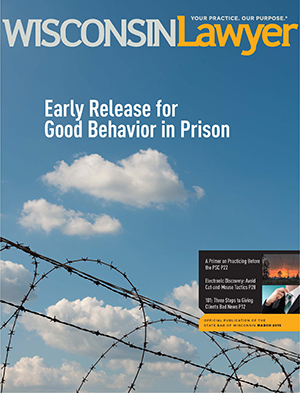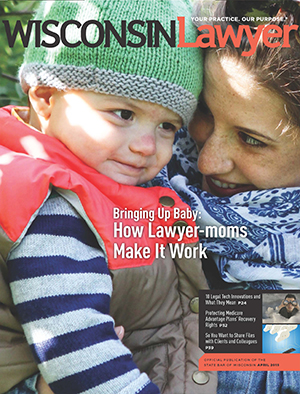Proposed Changes to Noncompete Agreements May Harm Employees and Businesses
 Dan Finerty’s recent article “Restrictive Covenant Reform Introduced in the Wisconsin Legislature” (InsideTrack, April 1, 2015), regarding the proposed legislation (SB 69), serves the bar well. For all should be aware of the problematic proposed rewrite of Wis. Stat. section 103.465 regarding noncompete “agreements.” While it may already be a fait accompli, as suggested in the article, such is not yet the case. Business lawyers, their many employer clients, as well as those who represent employees and executives, and those who care about Wisconsin’s future, should be concerned, as the proposed law could well have a deleterious impact on the ability of companies to hire the talented individuals they might prefer to fill their staff openings.
Dan Finerty’s recent article “Restrictive Covenant Reform Introduced in the Wisconsin Legislature” (InsideTrack, April 1, 2015), regarding the proposed legislation (SB 69), serves the bar well. For all should be aware of the problematic proposed rewrite of Wis. Stat. section 103.465 regarding noncompete “agreements.” While it may already be a fait accompli, as suggested in the article, such is not yet the case. Business lawyers, their many employer clients, as well as those who represent employees and executives, and those who care about Wisconsin’s future, should be concerned, as the proposed law could well have a deleterious impact on the ability of companies to hire the talented individuals they might prefer to fill their staff openings.
The proposed revisions would impact a far broader segment of the work force than was ever intended for these types of agreements or, to date, is commonly used. Every wage earner working in low- and moderate-skilled positions such as a cleaning service, hair salon, machine shop, law firm, medical group, auto repair shop, and so on would be subject to these agreements. Yet such a worker has no real negotiating power when initially seeking employment. They will be required to sign a noncompete agreement as a condition of employment. These individuals, unless independently wealthy, which is extremely unlikely, cannot afford to either sit out of work for one to two years or relocate to another state or to some other part of Wisconsin. Every fast food chain could require all employees to sign such a noncompete agreement and why not? The legislature says this is “good for business” without any consideration for the many workers impacted or the actual need for such protection.
We Want to Hear from You! Submit a Letter to the Editor
Wisconsin Lawyer provides a forum for members to express ideas, concerns, and opinions on law-related subjects. Send comments to wislawyer@wisbar.org (include “Letters” in the subject line), or mail to Wisconsin Lawyer “Letters,” P.O. Box 7158, Madison, WI 53707-7158. Limit to 500 words. Writing guidelines available.
The noncompete agreement, with its draconian enforcement mechanism, could well become a form of indentured servitude. It would enhance an employer’s ability to dictate the wages, hours, and conditions of employment, as the employee would not be able to find alternative employment. Such leverage on the part of an employer will serve to depress wages here in Wisconsin. It is highly ironic that a legislature that expressed such concern for workers by enacting a so called “Right to Work” law (essentially eliminating union protections) is now rushing to adopt legislation that chains employees to a particular employer. In addition, highly talented workers coming from other states will either negotiate a de minimis agreement or, if unable to do so, upon advice of counsel, find employment elsewhere. Thus, Wisconsin employers become further disadvantaged in their ability to attract highly talented and sought-after employees from outside the state – precisely the type of employees that can help generate economic growth.
While the article condemns the current statute as “overtly hostile,” and refers to Wisconsin’s courts as being imbued with “hostility” toward such agreements, that is not a widely held perspective. In Star Direct the Wisconsin Supreme Court modified the import of the statute, and in Runzheimer (currently pending) it will have yet another opportunity to interpret it. So why the sudden need for change? That would seem to be especially the case if, as Mr. Finerty notes:
“The Wisconsin Supreme Court has recognized that, in order to be enforceable, a restrictive covenant must be reasonably necessary for the protection of the employer, provide a reasonable time limit, provide a reasonable territorial limit, not be harsh or oppressive to the employee, and not be contrary to public policy.”
The wholesale rewriting of a statute that has served Wisconsin well for many years should be done with great care, lest it cause unanticipated harm to the very “interests” who might mistakenly view passage of SB 69 as being of benefit. The old adage “be careful what you wish for” seems apropos.
Atty. M. Nicol Padway
Padway & Padway Ltd., Milwaukee
Atty. Charles S. Blumenfield
Blumenfield & Shereff LLP, Mequon
Not Every “Nonviolent” Prisoner is a Good Candidate for Early Release Programs
 As a prosecutor for over 20 years, I feel compelled to respond to Professor O’Hear’s article, “Let the Good Time Roll: Early Release for Good Behavior in Prison” (Wisconsin Lawyer, March 2015), advocating “good time” for prison inmates. In my opinion, the article painted a somewhat inaccurate picture regarding early-release opportunities for incarcerated offenders and reached the wrong conclusion about the desirability of awarding good time.
As a prosecutor for over 20 years, I feel compelled to respond to Professor O’Hear’s article, “Let the Good Time Roll: Early Release for Good Behavior in Prison” (Wisconsin Lawyer, March 2015), advocating “good time” for prison inmates. In my opinion, the article painted a somewhat inaccurate picture regarding early-release opportunities for incarcerated offenders and reached the wrong conclusion about the desirability of awarding good time.
As Professor O’Hear is no doubt aware, many inmates are released early from prison after completing either the Challenge Incarceration Program (Boot Camp) pursuant to Wis. Stat. section 302.045 or the Substance Abuse Program pursuant to Wis. Stat. section 302.05. In fact, these programs, supposedly intended for “nonviolent” offenders, have resulted in the release of armed robbers and individuals convicted of recklessly endangering safety by using a firearm, knife, or other weapon.
While the article cites two out-of-state studies that conclude that good-time programs reduce the recidivism rate (and one that concluded the opposite), I personally have prosecuted many offenders who have had their prison sentences reduced by years after completing an early-release program and then committed additional crimes. In speaking with prosecutors throughout Wisconsin, I know my experience is not unusual. Given this, I have to question the accuracy of these studies and their applicability to Wisconsin.
The article also omits mention of Wis. Stat. section 973.195, which allows inmates to petition the sentencing judge for early release after serving 75 percent to 85 percent of their sentence, depending on the severity of the offense. Rather than leaving early-release decisions up to unaccountable DOC employees (who often appear more concerned about protecting the DOC’s budget than the public), I believe the judge, who is directly accountable to the public, should make this determination. I suspect that if a poll was taken on this issue, a majority of respondents would agree.
Although good-time credit may be appropriate for truly nonviolent offenders, how do you define this term? Does it include heroin dealers who sell an illegal product that frequently results in the user’s death? What about drunk drivers who cause mayhem and destruction on almost a daily basis? Should the definition include the aforementioned armed robbers, shooters, and stabbers who are currently eligible for early-release programs merely because the legislators who created the eligibility rules for the early-release programs either didn’t know or care that these are not chapter 940 offenses (Crimes Against Life and Bodily Security) which are excluded from these programs?
It never ceases to amaze me that while advocates of early-release programs are quick to point out that racial minorities are overrepresented in the prison population, they rarely if ever mention that minorities also make up a disproportionate percentage of all crime victims, including murder victims. I doubt this is unintentional on their part.
If Professor O’Hear is going to advance the argument that a good-time policy will save Wisconsin taxpayers money, he should also be prepared to put a value on the lives and well-being of innocent people because surely that will be the price to be paid if Wisconsin’s truth-in-sentencing law is further weakened.
Atty. Gerald A. Urbik
Rock County Assistant District Attorney
(608)757-5803
U.W. Lawyer Skills Program Seeking Ideas for Additional Subjects
I am exploring the idea of creating a new module for our Lawyering Skills (“General Practice”) course and am seeking ideas for a potential subject area. We currently have these modules: Criminal Proceedings; Divorce & Guardian ad Litem; Small Business; Estate Planning & Probate; Residential Real Estate; Managing the Early Years of Practice; Preparing a Case for Civil Trial. Using these modules, we (through visiting practicing lawyers) teach students the skills that lawyers would use in those areas. Our focus is on lawyering skills, including problem-solving, fact investigation, oral and written communication, client interviewing and counseling, negotiation, organization and management of legal work, and ethical dilemmas.
A long introduction to my question: Can you think of any (somewhat discrete) legal area that a new lawyer is likely to encounter in the first three years of practice and that would be a good vehicle for teaching our targeted skills? The area must be sufficiently basic that I can find a broad base of lawyers willing to come teach our students. So far, others have suggested these legal areas: Immigration; Consumer; Intellectual Property; Landlord/Tenant; Bankruptcy/Creditor-Debtor; Elder Law.
If you have any suggestions or thoughts, please let me know.
Atty. Gretchen Viney
(608) 262-8048
Here’s What You May Have Missed
Not connecting with us online? This month we highlight readers’ comments posted to online articles. Let’s hear what you have to say. Post comments to WisBar News, InsideTrack, and Wisconsin Lawyer articles or respond to Facebook, LinkedIn, and Twitter posts. Or simply email the editors at wislawmag@wisbar.org.
Threats to File a Disciplinary Complaint Against Opposing Counsel
In their “Ethical Dilemmas” column (InsideTrack, March 18, 2015), State Bar Ethics Counsel Tim Pierce and Assistant Ethics Counsel Aviva Kaiser asked, “Has opposing counsel ever threatened to file a disciplinary complaint against you to gain an advantage in a civil case?” While such threats are not expressly prohibited, they advised that a lawyer considering making such a threat should carefully consider the Rules of Professional Conduct.
A reader wrote in with the statutory analysis.
IT Online: Thanks Tim and Aviva for a fine analysis of the SCRs as they relate to a threatened ethical violation to gain advantage. Missing is a statutory analysis:
Wis. Stat. section 947.013(1m)(b) makes it a Class B forfeiture to engage “in a course of conduct … which harass or intimidate the person and which serve no legitimate purpose.”
Wis. Stat. section 942.01 prohibits defamation, which “is anything which exposes the other to contempt … degradation or disgrace in society or injury in the other’s business or occupation.” This is a Class A misdemeanor.
Wis. Stat. section 943.30 and .31 are felonies proscribing “threats to injure” – particularly 943.31, “Threats to Communicate Derogatory Information: Whoever threatens to communicate to anyone information, whether true or false, which would injure the reputation of the threatened person or another unless the threatened person transfers property to a person known not to be entitled to it is guilty of a Class I felony.”
Anyone, not just a lawyer, who makes threats of disclosing improper conduct in order to get more money or a better deal may be violating one or more of these criminal statutes. And, of course, the SCRs prohibit lawyers from committing crimes.
Atty. Steve Kravit
Kravit, Hovel & Krawczyk SC, Milwaukee
Author Response: Thank you, Steve, for enriching the column by adding the criminal statutes in your comment. We limited the column to our expertise, the Rules of Professional Conduct. Consequently, we pointed out that it is misconduct under SCR 20:8.4(b) for a lawyer to “commit a criminal act that reflects adversely on the lawyer’s honesty, trustworthiness or fitness as a lawyer in other respects,” but we did not include references to particular criminal statutes.
Atty. Aviva Kaiser
State Bar of Wisconsin, Madison
Bringing Up Baby: Not Just a “Woman’s” Issue
 Raising children while working outside the home continues to be a challenge for 21st-century parents, but some developments in the past few decades help bring women lawyers closer to equilibrium. In “Bringing Up Baby: How Lawyer-Moms Make It Work” (Wisconsin Lawyer, April 2015), author Kara Higdon Getter compared today’s challenges to those expressed in a 1986 article that examined how lawyer-moms maintained their work-life balance. Readers weighed in.
Raising children while working outside the home continues to be a challenge for 21st-century parents, but some developments in the past few decades help bring women lawyers closer to equilibrium. In “Bringing Up Baby: How Lawyer-Moms Make It Work” (Wisconsin Lawyer, April 2015), author Kara Higdon Getter compared today’s challenges to those expressed in a 1986 article that examined how lawyer-moms maintained their work-life balance. Readers weighed in.
WL Online: I think it was a mistake to focus only on lawyer “moms,” not lawyer parents. Whether or not that was an appropriate focus 29 years ago, doing so now reinforces the stereotype that child care is and should be women’s work, and that problems about juggling work and family are primarily women’s concern. I was fighting against this stereotype when I graduated law school in 1986, when I had children (with a very involved husband) in the 1990s, and, sadly, as this article shows, still today. You would have done a much better service to look at the issues facing all parents – and perhaps the biases, such as those embedded in this article, that may make it less socially acceptable for men to seek to increase their caregiving roles. Firms and companies should be helping parents and caregivers achieve the balance they desire.
Atty. Karyn Rotker
ACLU WI Foundation, Milwaukee
WL Online: I agree that I wish this article would have focused on lawyer-parents. The FMLA is also not just for maternity leave as the insert states, but for parental leave – for men and women! It’d be nice to see a follow-up article on lawyer parents, or perhaps even two-lawyer families. I practice in a smaller community, and we have 12 couples with two attorneys.
Atty. Kathleen McDaniel
Manitowoc City Attorneys Office, Manitowoc
Author’s Response: My article was intended to draw comparisons and distinctions with the 1986 article, a piece that focused solely on lawyer-moms and the challenges they face. Much has changed since 1986. As such, I acknowledged the changing role of men as lawyer-parents early on in the article. I think the points each of you raised have merit, and I thank you for your comments.
Atty. Kara Higdon Getter
Stafford Rosenbaum LLP, Milwaukee
